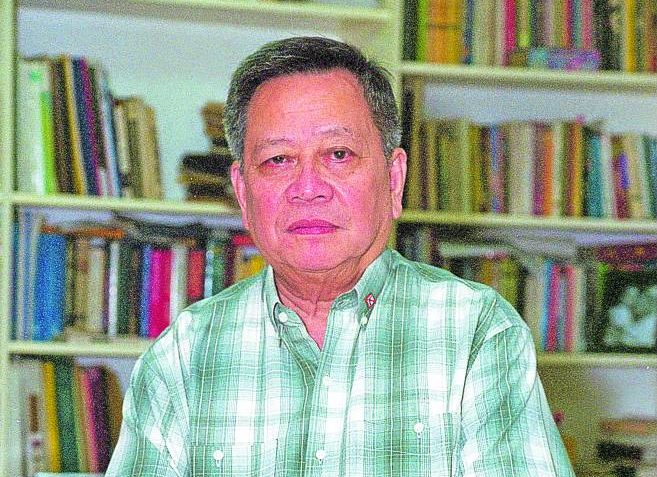Nandy Pacheco, crusader for a gunless society; 89

Nandy Pacheco (File photo from Philippine Daily Inquirer)
MANILA, Philippines — Sometime in 1990, Henrietta “Tita’’ de Villa and her husband were waiting for their flight to Hong Kong at Ninoy Aquino International Airport when she spotted her high school classmate Priscila Pacheco and her husband Reynaldo “Nandy” Pacheco in the crowd of seated passengers.
Hardly had they warmed up in that chance meeting when Nandy launched into a spirited talk about the dangers posed by the proliferation of guns, and the need for a “gunless society,” as De Villa would later write in her introduction to the book, “Nandy Pacheco: The Man Behind Gunless Society,’’ published in 2018.
‘Tenacity for a good cause’
“As he spoke, Nandy’s eyes glistened and he could hardly catch his breath, his enthusiasm was brimming over,’’ said De Villa, the country’s ambassador to the Vatican from 1996 to 2002. “Indeed he was the most spirited advocate for any cause I had ever met, seen and heard.’’
The founder of Gunless Society, who had lobbied for a total gun ban since the late 1980s and later sought to introduce reforms in politics, died of a heart attack on Friday. He was 89.
“Nandy Pacheco was a passionate, tireless, persistent crusader. His idea of a Gunless Society was, and still is, a very sensible approach to achieving peace in our communities. It is workable. It needed the push of legislation,” Santiago Dumlao, who ran for president in 1998 with Pacheco as his running mate, told the Inquirer in a text message.
“He is an example of a Filipino whose tenacity for a good cause … was unparalleled and most worthy. It was his solid Christian faith that mobilized him to the end. We Filipinos are blessed we had a Nandy Pacheco,’’ Dumlao added.
Random shootings
In 1987, alarmed by news of random shootings, Nandy, a lawyer and then chief information officer of the Asian Development Bank, and several friends, including National Artist F. Sionil Jose, formed Nature, or National Action for Total Uplift and Restoration of the Environment, to foster reverence for life, safe environment, and good stewardship.
Nature soon gave birth to Gunless Society, which envisioned a Philippine society where only soldiers, policemen, and other law enforcers could carry guns in public while on duty and in uniform.
As a young boy, Nandy lived through the horrors of World War II. That early he realized the senselessness of deaths by gunfire.
In 1991, following the killings of aspiring model Maureen Hultman and her friend Roland John Chapman by Claudio Teehankee Jr. in a Makati village, and of young executive Eldon Maguan by Rolito Go in a traffic altercation in San Juan, Nandy, and his friends pushed for a total gun ban.
This advocacy drew support from the public and from then-President Corazon Aquino, who certified as urgent the proposed Anti-Deadly Weapons Act of 1991.
That measure was a consolidation of Senate Bill No. 1792, sponsored by Senators Aquilino Pimentel Jr. and Alberto Romulo, and House Bill No. 34057, sponsored by Sorsogon Rep. Bonifacio Gillego. Both bills were inspired by Nandy’s Gunless Society.
The Senate passed the measure, but it was shot down by the House committee on public order and safety, chaired by the president’s brother, then Tarlac Rep. Jose Cojuangco.
Nandy was unfazed. He decided to bring his campaign to the next level.
Entering politics
In the 1998 general elections, Dumlao and Nandy teamed up to run for president and vice president, respectively, under Partido Bago, on a platform of “Put God First” and “Biyaya Economics.”
But they lost to the popular Joseph Estrada who won as president and previous senatorial topnotcher Gloria Macapagal-Arroyo who won as vice president.
Pacheco thereafter launched Ang Kapatiran, or Alliance for the Common Good, a political party based on the teachings of the Catholic Church. The party drew public support from some bishops and was accredited by the Commission on Elections in 2004.
Ang Kapatiran fielded gastroenterologist Martin Bautista, tax lawyer Adrian Sison and former assemblyman Zosimo Jesus Paredes II as its senatorial bets in the 2007 midterm elections; former Olongapo City councilor JC de los Reyes as its presidential candidate in the 2010 general elections; and Delos Reyes, Lito David, and Marwil Llasos as senatorial candidates in the 2013 midterm elections.
Ang Kapatiran somehow captured the public imagination, but this wasn’t enough to hand over victory to any of its candidates.
The party boycotted the 2016 elections in which Rodrigo Duterte won as president, as it pushed for a shift to a parliamentary-federal system of government.
‘Example of the laypeople’
In a Sept. 21, 2011, commentary for the Inquirer titled “Choosing someone for canonization,” humanitarian and former Jesuit priest Denis Murphy wrote: “Where in Philippine society is such a man? If pushed to respond many might point to Nandy Pacheco. Remember we are not choosing here the man we think is best suited for sainthood, but rather the one we think the Church might choose as an example of the laypeople it seeks for its work in the world.’’
Nandy is survived by his wife Priscila, children Ma. Rosario Victoria, Reynaldo Jr., Roberto and Cecilia, children-in-law and a great grandchild.
His wake is at the Haven of Angels Memorial Chapels & Crematorium, Km. 26 Sumulong Highway, Barangay Sta. Cruz, Antipolo City, until Tuesday, from 2 p.m. to 8 p.m. The funeral Mass will be held on Wednesday at the Christ the King Parish, Greenmeadows, Quezon City, at 2 p.m.
RELATED STORIES
Duterte shouldn’t issue ‘kill order,’ says Gunless Society PH